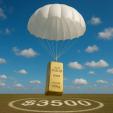Euro Falls After Weak German Industrial Production Data
Canbera-Australia (October 7) The euro slipped against its major rivals in European deals on Tuesday, as German industrial production declined at the fastest pace since January 2009 in August, raising concerns that Europe's largest economy might be heading for recession.
A report from Destatis showed that German industrial production fell 4% month-on-month in August following the revised 1.6% rise in July. This was the biggest annual decline since January 2009 and was much larger than the expected fall of 1.5%.
Investor sentiment was also undermined on fears that Federal Reserve might normalise its monetary policy sooner-than-expected. Traders await the minutes of Fed's September 16-17 policy meeting due tomorrow, to gauge the time line of its rate hike.
Pulling away from an early high of 1.2664 against the US dollar, the euro edged down to 1.2582. The next possible downside target for the euro-greenback pair lies around the 1.24 zone.
The euro hit a 4-week low of 136.76 against the yen, off early high of 137.75. Continuation of downtrend may take the euro to a support around the 136.00 area.
The Bank of Japan kept its monetary policy unchanged at its October meeting as widely expected by economists.
The bank maintained its pledge to increase the monetary base at an annual pace of about JPY 60 - JPY 70 trillion .
The euro remained weaker against the pound, trading at 0.7839. At yesterday's close, the pair was quoted at 0.7865. If the euro continues its slide, 0.775 is seen as its next support level.
UK industrial output remained flat in August from July, data from the Office for National Statistics showed.
That follows a 0.4% rise in July. The month-on-month increase in manufacturing slowed to 0.1% from 0.3% a month ago.
Having advanced to near a 2-month high of 1.2139 against the Swiss franc in early deals, the euro reversed direction and dropped to 1.2104 shortly thereafter. Further weakness may lead the euro to a support around the 1.20 region.
The single currency declined to near a 3-week low of 1.4336 against the aussie, retreating from an early high of 1.4456. The euro is likely to challenge support surrounding the 1.42 area.
The euro that climbed to a 4-day high of 1.4111 against the Canadian dollar at 11:35 pm ET edged down to 1.4063 in European deals. Next key support for the euro may be eyed around the 1.40 mark.
The euro eased back to 1.6081 against the NZ dollar, from an early high of 1.6205, and held steady during European deals. The euro may test support near the 1.60 mark.
Looking ahead, US consumer credit for August is due to be released in the New York session.
At 2:30 pm ET , Federal Reserve Bank of Minneapolis President Narayana Kocherlakota will deliver a speech on "Clarifying the Objectives of Monetary Policy" in South Dakota .
At 3:00 pm ET , Federal Reserve Bank of New York President William Dudley will deliver a speech before an event hosted by the Rensselaer Polytechnic Institute in Troy, New York
Source: AllianceNews










